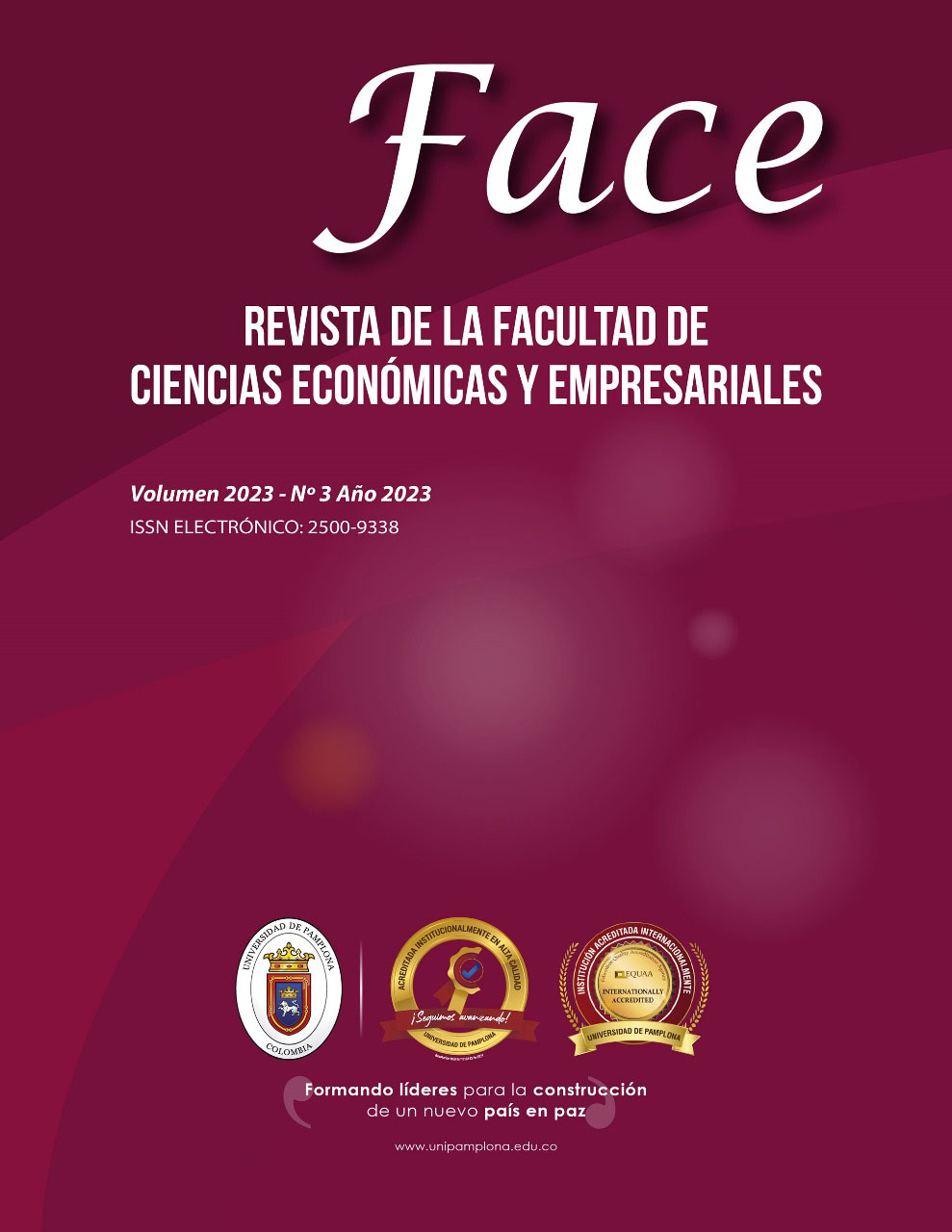The importance of the 'Shop to Shop' program in Pamplona, Norte de Santander, as support for microenterprise strengthening policy.
DOI:
https://doi.org/10.24054/face.v23i3.2620Keywords:
Strengthening, popular economy, microenterprise, store, PamplonaAbstract
The National Development Plan “Colombia world power of life” 2022-2026”, establishes as one of the catalysts: the policy of productive inclusion with decent work and support for entrepreneurship, giving special recognition and promotion to the Popular and Community Economy (EPC).In this framework, the Pact with the Popular and Community Economy is established, which proposes strategies for its recognition, strengthening and sustainability. The popular economy refers to commercial trades and occupations (production, distribution and marketing of goods and services) and non-commercial (domestic and community) developed by low-scale economic units, whether
personal, family, microbusinesses or microenterprises, in any sector. economic. Taking the above into account, the “STORE TO STORE” program was developed, which focused on low-scale economic units (people, microbusinesses or microenterprises) of the economic sector of grocers selling retail groceries in the city of Pamplona, North of Santander; in order to promote the strengthening and sustainability of micro and small businesses, including the economic units of the Popular and Community Economy (EPC). Within the program, a
financial assistance component is also conceived with connection to the offer of formal financing. Likewise, this includes components of organizational, commercial, and digital capabilities that promote the sustainability of the productive unit.
Downloads
References
Acevedo, C. (2017). Las tiendas de barrio desde la economía institucional. IJMSOR: International Journal of Management Science & Operation
Research, 2(1), 30-37.
Cámara de Comercio de Pamplona (2021). Concepto sobre la situación económica de sus respectivas zonas. Disponible en chromeextension://efaidnbmnnnibpcajpcglclefindmkaj/https://camarapamplona.org.co/camara2/sites/default/files/1.%20CONCEPTO%20ECON%C3%93MICO%202020.pdf
Departamento Nacional de Planeación (2023). Plan Nacional de Desarrollo 2022-2026 – PND. Disponible en https://www.dnp.gov.co/plannacional-desarrollo/pnd-2022-2026
Hoffman, D. & otros. (2007). ‘Principios de Marketing y sus mejores prácticas. 3ra ed.”, Thomson: México.
Kotler, P. (2006). Dirección de Marketing”, México: Pearson Educación.
Lamb, Hair & Mc Daniel. (2011). Marketing. 11 Edición, Editorial Cengage Learning.
LONDOÑO ALDANA, E., & MERCADO SANMARTÍN, L. D. (2020). Las tiendas de barrio en Cartagena de Indias (Colombia): efecto de los grandes descuentos y repunte en medio del COVID-19. Revista Espacios, 41(42).
McCarthy, J. (1984). ‘Basic Marketing: Un Enfoque Gerencial. 8a ed.”, Buenos Aires: El Ateneo. Ministerio de Comercio, Industria y Turismo (2023). Convenio Marco de Entendimiento suscrito entre el Ministerio de Comercio, Industria y Turismo y la Confederación de Cámaras de Comercio – Confecámaras. Disponible en https://confecamaras.org.co/noticias/912-ministro-de-comercio-industria-y-turismoresalta-en-congreso-confecamaras-laimportancia-del-trabajo-de-las-camaras-decomercio-con-el-sector-publico
La Opinión (2023). Pamplona: ‘tienda a tienda’ buscan que esos microempresarios crezcan. Disponible en https://www.laopinion.com.co/economia/pam
plona-tienda-tienda-buscan-que-esosmicroempresarios-crezcan
Moreno, M. (2005). ‘Mercadeo Estratégico. 1ra ed.”, Bogotá: Universidad Nacional Abierta y a Distancia.
Paramo, D. & Ramírez, E. (2010). Significaciones y rituales asociados a la labor de los tenderos de barrio, Barranquilla: Pensamiento y Gestión Escuela de Negocios Universidad del Norte.
Paramo, D. García, O.L & Arias, M.O. (2011). ‘Hacia una tipología de tenderos de Manizales”, Pensamiento y Gestión. Barranquilla: Escuela de Negocios Universidad del Norte.
Published
Versions
How to Cite
Issue
Section
License
Copyright (c) 2023 FACE: Revista de la Facultad de Ciencias Económicas y Empresariales

This work is licensed under a Creative Commons Attribution-NonCommercial-ShareAlike 4.0 International License.





